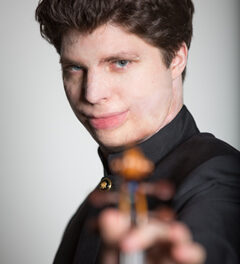Widely regarded as the apex of naturalistic verismo opera, Puccini’s La Bohème has always straddled unnatural extremes when it comes to staging. The first and last acts are confined to an artists’ garret that can hardly be stretched to the width of the Metropolitan Opera stage without making the poverty of the artists look a little like luxury. On the other hand, the middle acts bring us outdoors, and the Belk Theater, where Opera Carolina is staging Bohème, is hard-pressed to contain all the teeming life Puccini and his librettists depict.
Sure enough, after the sold-out house at the Belk applauded Peter Dean Beck’s set design for Act 2’s Latin Quarter street scene, military cadets were obliged to march in single file to execute their parade. Kids chasing after Parpignol the toy vendor were under similar constraints chorusing their delight, and Musetta, who has been known to arrive grandly in a horse-drawn carriage at the Met, made her splashy entry at the Belk more modestly on foot, shadowed by her hapless sugar daddy, Alcindoro. As for the famed Café Momus where Rodolfo and Mimi snuggle together during their first meal as a couple, a finicky observer might detect more waiters than tables. Under these woefully cramped conditions, it’s no easier following all the action than it is when assaulted by the Met’s two-tiered panorama.
These economies are more than counterbalanced indoors in the outer acts, where Mimi and Rodolfo first meet in the intimate dim light on Christmas Eve and where later she comes home to die. To fill the Met stage, Franco Zefferelli had to construct an apartment building, crowned by a lordly chimney – then cut out the upstairs wall of the garret for us to spy on the singers. So the lovers and their artistic circle are recessed upstage at the most tender and poignant moments of the opera. At the Belk, the lovers are as close to the lip of the stage when Mimi expires as they were when the Bohemians observed the passing parade.
Vis-à-vis the Met performance I attended last January, starring Ramòn Vargas and Maija Kovalevska; the Opera Carolina production conducted by James Meena also benefits from more youthful protagonists – and an ethnically diverse circle of bohemians that will quickly win favor with a contemporary audience. At an ascending point in his career, Noah Stewart as Rodolfo is more than a match, vocally and theatrically, for Vargas, who will reach his 50th birthday later this year. Likewise, there is a more youthful bloom in Sandra Lopez’s singing – and more of Mimi’s fragility – than I could find in the comparatively leaden Kovalevska.
In their Opera Carolina debuts, both Stewart and Lopez sounded tentative at first as they marshaled their strength for the great exchange of arias that climaxes Act 1 – and for their repeat performances scheduled the following afternoon. There were slightly raspy seams in Stewart’s voice as he cavalierly sacrificed the manuscript of Rodolfo’s three-act drama to the stove and joshed with his roommates. Conversely, Lopez’s wide lusty vibrato belied the weakness of a consumptive who had struggled to reach the top of the stairs. But as the love scene developed, Lopez softened and Stewart strengthened. If a little strain was still evident as Stewart climbed the stave, it only enhanced the earnestness of his “Che gelida manina” when he confessed the transformative effect of Mimi’s eyes.
Everything about the Opera Carolina production reaches full strength in Act 3 at the outskirts of Paris beneath Hell’s Gate – or it did on opening night after problems with the snow distribution apparatus were sorted out. That wide vibrato became the perfect instrument for Lopez to express Mimi’s anguish and desperation as she appealed to Rodolfo’s best friend Marcello for help. And her first heart-stopping pianissimo as she bade Rodolfo “Addio!” served notice that she would be able to plumb all the poignancy of Act 4. Unexceptional in the first two acts, baritone David Won thaws out enough as Marcello to empathize convincingly with Mimi, then reverts to a steely stiffness that is now apt for scolding Rodolfo and breaking up with Musetta. As for soprano Elizabeth Williams-Grayson, her beauty and swagger as the demimondaine queen were more commanding than her “Musetta’s Waltz.” So the streamlined vocal demands of the Act 3 climax – where Musetta acts the flamboyant libertine but quickly immerses herself in the emotional quartet – are tailored perfectly for Williams-Grayson’s strengths and weaknesses.
Once Mimi entered Rodolfo’s humbly furnished garret, Act 4 more than fulfilled the expectations roused by the lovers’ tender reconciliation out in the snow. Stewart sounded piercingly aggrieved, and with good reason. Lopez has an extra talent that we don’t look for in tragic sopranos as they lie on their deathbeds: she can smile as she’s singing her heavenly pianissimos. Beaming up to the top balcony, Lopez’s smile adds a beatific aura to Mimi’s last homecoming, an aura I felt lucky to experience.











